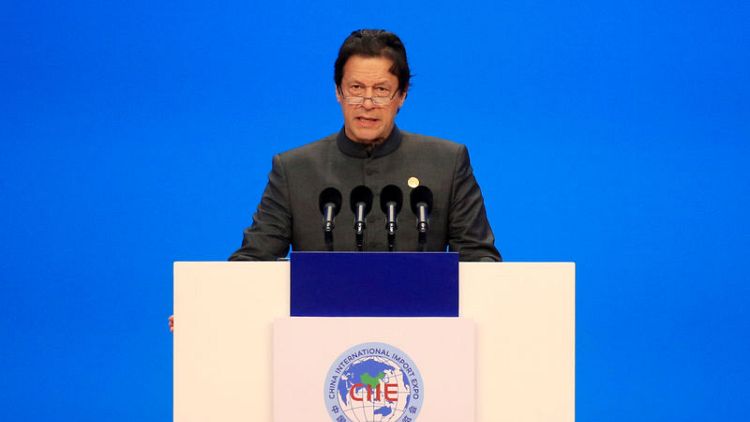By Hamid Shalizi
KABUL (Reuters) - Afghanistan has recalled its ambassador from Pakistan over reported remarks by Pakistani Prime Minister Imran Khan that suggested Kabul should set up an interim government, calling the comments "irresponsible."
Khan told Pakistani journalists on Monday that forming an interim Afghan government would smooth peace talks between U.S. and Taliban officials since the militant group refuses to speak to the current government, according to comments published in The Express Tribune.
“The Afghan government was a hurdle in (the) peace process that was insisting that Taliban should talk to it,” Khan was quoted as saying.
He also said he had cancelled a scheduled meeting with Taliban leaders because of objections by the Afghan government.
Afghanistan summoned Pakistan's deputy ambassador to discuss the "irresponsible" remarks by Khan, foreign affairs ministry spokesman Sibghatullah Ahmadi said in a series of tweets on Tuesday.
The Afghan government deemed Khan's statements as "an obvious example of Pakistan's interventional policy and disrespect to the national sovereignty and determination of the people of Afghanistan," Ahmadi said.
U.S. Special Representative Zalmay Khalilzad, the chief U.S. negotiator with the Taliban, weighed in on Kabul's side, saying on Twitter that while Pakistan had made "constructive contributions" to the peace process, "Khan's comments did not."
"The future of Afghanistan is for Afghans, and only Afghans, to decide. The role of the international community is to encourage Afghans to come together so they can do so," Khalilzad added.
The Afghan-born U.S. diplomat's comments come amid tensions between Washington and Kabul over Khalilzad's exclusion of the Ghani government from the talks with the Taliban. Khalilzad is pressing the Taliban to hold talks on Afghanistan's political future with a broad spectrum of Afghans, including government officials.
The Afghanistan-Pakistan row marks the third time in just over a month that Kabul demanded an explanation from Islamabad over comments related to peace talks, illustrating the flaring tensions between the two neighbours at a sensitive time.
U.S. and Taliban officials have held recurring talks to end the 17-year war, but the Taliban considers the Afghan government led by President Ashraf Ghani as illegitimate.
Ghani's mandate expires in May, and pressure is mounting on him to step down before the next presidential election, scheduled for Sept. 28. Ghani has rejected the idea of an interim government.
(Reporting by Hamid Shalizi in Kabul; Additional reporting by Jonathan Landay in Washington; Writing by Rod Nickel; Editing by Gareth Jones, Peter Graff and Peter Cooney)
